Wesfarmers CEO Rob Scott on an Olympic rowing past, banking background and his company’s big future
Rob Scott has overseen Wesfarmers transformation into the country’s ninth-largest corporation. And with its recent acquisition of Priceline, he reveals where he sees the company heading.
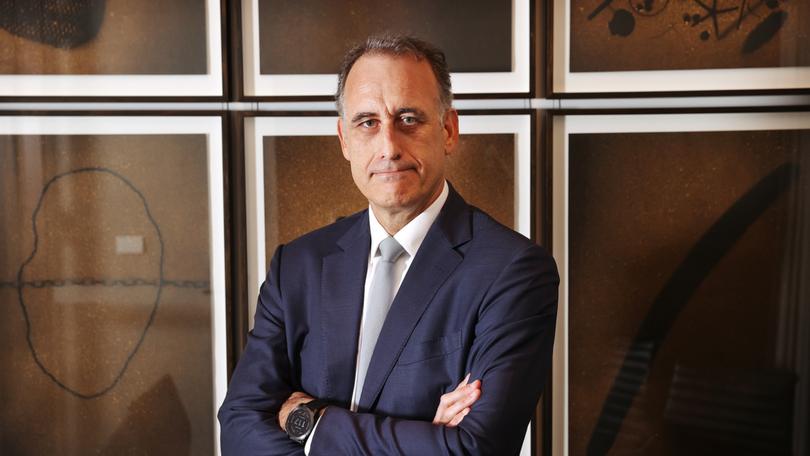
To mark its centenary a decade ago, corporate powerhouse Wesfarmers published a book detailing its journey from farming co-operative to ASX giant. About two-thirds of the way through the 300-page coffee table title, the author marvels at how Wesfarmers’ market capitalisation grew from $30 million at its 1984 listing to more than $40 billion as a 100-year-old entity.
Closing in on a decade later, that market capitalisation has surged further, to nearly $76 billion. A series of savvy decisions — and the eventually positive effect of a pandemic on demand for its department store and home-office divisions — by chief executive Rob Scott have further strengthened Wesfarmers, cementing its reputation as investor safe haven and reliable performer. It’s now the country’s eighth-largest corporation, by market cap.
Scott took the reins in late 2017 and quickly took action: in his first year he sold its Curragh coal mine in Queensland, pulled the pin on the group’s ill-fated expansion of Bunnings into the UK, sold Kmart’s tyre and auto division and demerged Coles after nearly 11 years in the portfolio — leaving Wesfarmers as a much healthier supermarket chain.
Sign up to The Nightly's newsletters.
Get the first look at the digital newspaper, curated daily stories and breaking headlines delivered to your inbox.
By continuing you agree to our Terms and Privacy Policy.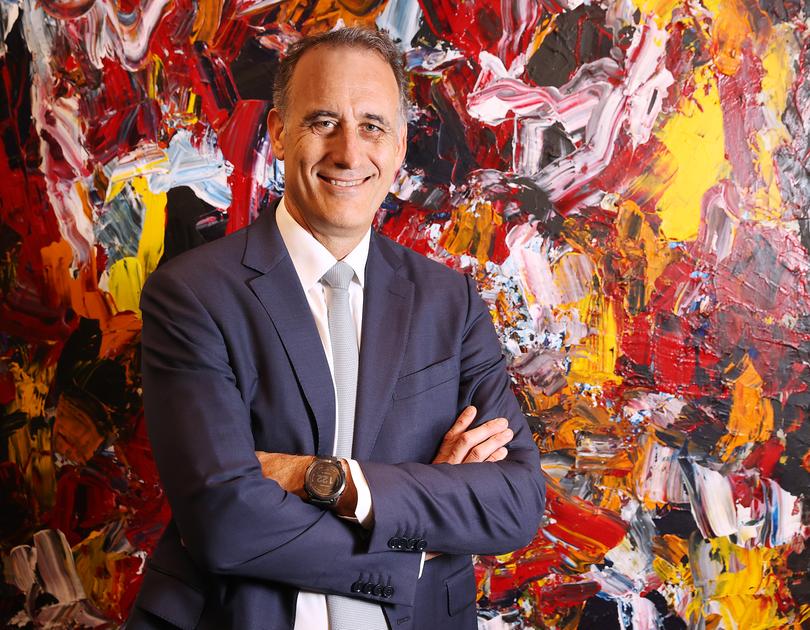
Since then, the conglomerate has picked up Kidman Resources — the former owner of the Mt Holland lithium mine 460km east of Perth — online retailer Catch and beefed up Bunnings via Adelaide Tools and Beaumont Tiles. It now has designs on growing its newest division, Wesfarmers Health, anchored by 2022 purchase Australian Pharmaceutical Industries, the parent company of Priceline. It’s since nabbed Instant Scripts and Silk Group, a network of beauty clinics.
Wesfarmers’ post-tax profit jumped 3 per cent in the first half of the 2024 financial year to almost $22.7b, pushing its share price up to a fresh two-and-a-half year high. The star performer was Kmart, with a bumper sales result, while reliable performer Bunnings also ticked higher as demand from retail and trade customers alike grew.
As Wesfarmers Health continues to grow, analysts are still eyeing its potential as it progresses through a transformation plan. Scott makes no bones about it — divisional flagship Priceline can do better.
“It’s a really interesting brand and asset,” he says of the pharmacy, health and beauty retailer which has 465 stores and and eight-million member strong loyalty program. “But there’s a lot of scope for improvement, and a lot of that relies on just retail fundamentals and basics — better product, better sourcing, better availability, better pricing, better digital channels, better services for our pharmacists that work there.”

Competition in pharmacy is likely to intensify this year if the competition regulator approves a $9 billion reverse takeover by omnipresent Chemist Warehouse of Sigma Healthcare. Scott sees greater roles for pharmacists in the health system, with some in other States now able to conduct medical tests.
“There’s a shortage of GPs, our hospitals — because there’s a shortage of GPs — our hospitals are getting backed up with people with non-acute cases,” he says. “So, the role of community pharmacy, and the role of Priceline, we think has a lot to go.”
Though now a truly national company, Wesfarmers holds a unique position in Western Australia’s psyche. It is perhaps largely attributable to its initial unique ownership stake and genesis — floating to avoid the notorious 1980s corporate raiders and restructuring but distributing 40 per cent of shares to co-operative members. By 2001, the co-operative model was over, with the remaining holdings exchanged for shares in a freely traded public company.
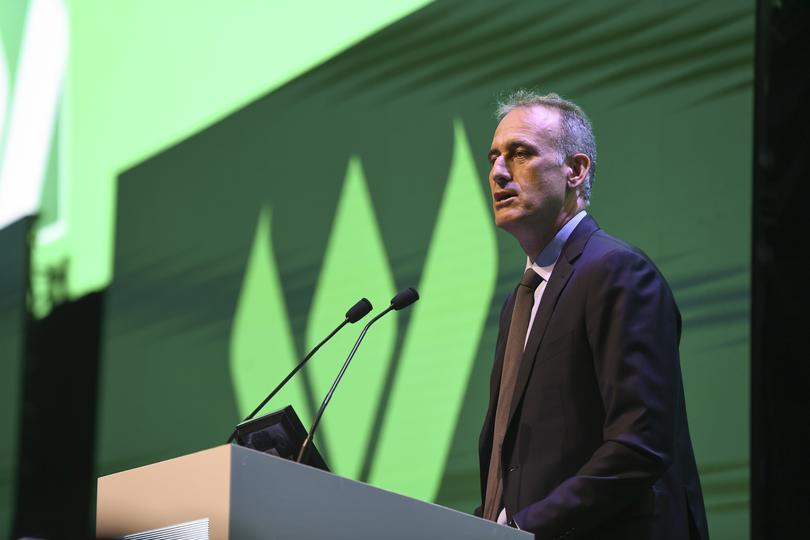
Since its 1984 stock exchange listing, Wesfarmers is the second-best returning stock of the ASX200, with returns of 152,546 per cent. Its well-attended Perth annual meetings are noted for their strong retail shareholder turnout.
“Being a shareholder, and holding shares probably bought when Wesfarmers first came into being . . . I live off Wesfarmers (dividends) — this is just a thank you to Wesfarmers and I hope they keep going because I’m hoping to keep going too,” said one shareholder at the October annual meeting, to a round of applause from the crowd.
Last year, the Wesfarmers share price rallied between $45.46 and $57.04, after a COVID-fuelled peak of $63.87 in August 2021.
So, what exactly drives the man leading an admittedly “humble” company to dizzying new heights?
Much has been written about Scott’s path to Wesfarmers. The former Olympic rower (he won a silver medal at the 1996 Atlanta Games) started with the company in 1993 before a stint with Ernst & Young and Deutsche Bank in the 1990s and early ’00s before returning to Wesfarmers in 2007 as managing director of its insurance division, now part of ASX-listed IAG.
Scott is just the eighth chief executive in 110 years and two of his predecessors — Michael Chaney and Trevor Eastwood — returned to chair the company. The 54-year-old says he is by nature introverted.
“I don’t like seeking the limelight,” he revealed during a wide-ranging interview at the company’s Brookfield Place headquarters, where our meeting room overlooks development at Perth’s Elizabeth Quay. “I am genuinely more of a team player than a solo player, so I enjoy seeing the success and progress of the team in the business without necessarily having to be the one at the centre.
“In fact, I know that the job of a leader is more about trying to get the best out of everyone around you, and that was just quite a natural fit around how I felt personally, and the type of organisation that Wesfarmers is.
“I think Wesfarmers attracts and suits people that are more humble, low ego, low politics. The people that have the big egos, like operating in a highly politically-charged environment, you know, they won’t do well with Wesfarmers. So, I think that’s part of the nature of our business, but also probably who I am personally.”
Scott says though working globally in investment banking was a fantastic experience through which he learnt a lot, he was drawn back to Wesfarmers, realising it was a unique company with a unique culture. Seventeen years on from his return, he says aspects of the company are very similar.
“We were living in Hong Kong, we just had our first child. So we were keen to get back to Australia to be close to family and friends. So there was a draw, not only back to Australia, but particularly to Wesfarmers,” he recalls.
“The very nature of Wesfarmers is we’re always evolving, not just in terms of the businesses within the portfolio but our ways of working the scope and scale of the group. But what I’d say hasn’t changed is the corporate objective the delivering a satisfactory return to shareholders we’re very shareholder return focused. Secondly, the focus on sustainability and a strong corporate reputation. That’s always been very important for Wesfarmers. And then finally the general culture of Wesfarmers. A sense of humility. Being proud, pragmatic, be very commercially disciplined those aspects of the group haven’t changed.”
I feel very comfortable just being who I am. I don’t think I necessarily have a ‘work me’ and a ‘personal me’.
Like the company he leads, Scott says there’s been little change in his personal approach since he became chief executive.
“I also feel that one of the most important roles of being a CEO is to try and keep your emotions under check,” he says. “And coming back to the importance of humility and (having) no egos. More often than not, bad business decisions come about through people that let their emotions get out of control.
“You see that in business, you see it in politics, you see it in the community. Our job as leaders is to be very objective, (to) try and be fact-based about what you know, what decisions you’re taking ... You have to be empathetic, but I think you can make better decisions, and you can be more empathetic if you’re trying to remain calm.
“Keeping your emotions under control, I think that’s really important.
“I feel very comfortable just being who I am. I don’t think I necessarily have a ‘work me’ and a ‘personal me’.”
Scott, who has a bachelor of commerce and a masters degree in applied finance, names his main interests outside work as spending time with his family — wife Liz and two teenage children. Perhaps unsurprisingly for a former elite sportsman, he tries to keep fit and healthy. He does yoga, attends the gym and — after a 20-year break — rows again, with a few old friends.
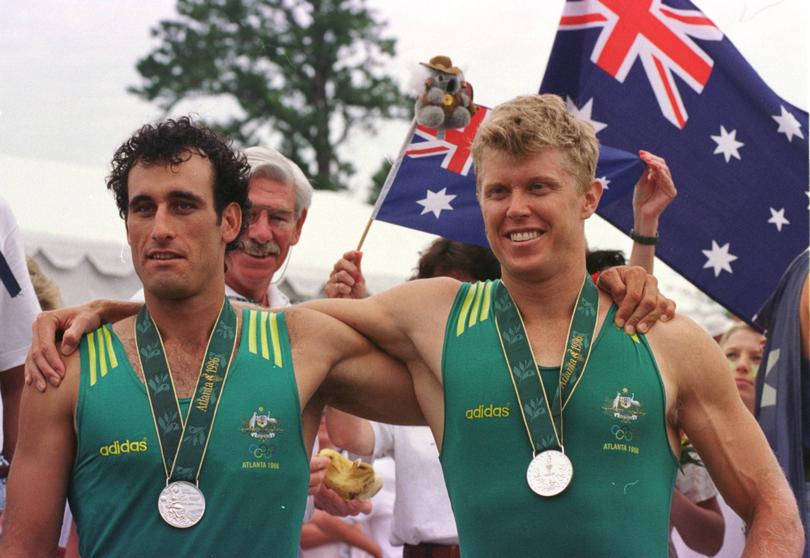
“When I finished competitive rowing, I had no interest in getting back in the boat, and did a whole lot of other things,” he says. “But after two decades of a break, we ended up getting back together for a reunion, a 20-year reunion. And we had a lot of fun, and we didn’t take ourselves too seriously. That just encouraged us to get back out on the water. So it’s very much for fun.”
Also challenging is the art of dealmaking — crucial in any business but particularly in Wesfarmers where divesting businesses that no longer fit and acquiring new ones for growth prospects is vital to the broader strategy. Though larger in size now, Scott points out the portfolio shrank early on when Coles and coal were offloaded.
“Sometimes you need to get smaller to grow faster,” he observes.
“I think acquisitions are always a hard one, we probably only execute one in every 100 deals that we look at, because it’s really hard to add value to an acquisition. And sometimes I think the bigger you get, sometimes it can be harder, because the size of the opportunity to really have an impact needs to be bigger.
“The bigger the transaction, the higher the risk, the harder it is to get really good value.”
Beaumont Tiles joining Bunnings, Instant Scripts being folded into Wesfarmers Health and a joint venture with Ora Banda are examples Scott cites of “really good” buys that, while not big transactions in the grand scheme of Wesfarmers, help improve earnings and returns. The focus on returns is paramount, he says, and is one of his primary priorities.
“The key criteria for whether we should invest in a new business or sell an existing business is all about shareholder value. That is the overriding criteria,” he explains.
“If we’re going to invest in a business we would only ever do so if we felt that investing in that business would help our group deliver a top quartile return.
“Often the decision to divest a business will be based on the fact that it’s a good business, but this business is better to be owned by someone else, because if we keep owning it, it’s unlikely that business is going to help us deliver a top quartile shareholder return.”

The criteria for deals under Scott and chief financial officer Anthony Gianotti, both former investment bankers, is “quite high”.
“It’s funny, some people thought that because we’re ex-investment bankers we’d be more inclined to do a lot of deals. It’s quite the contrary,” Scott says.
“I think what I learned through being an investment banker is that most acquisitions destroy value for the buyer. So we’re very, very cautious and disciplined around M&A.”
The first commercial production at Mt Holland is expected in the first half of this year. A joint venture with Chilean company SQM, Mt Holland comes online at a testing time for lithium — spodumene concentrate prices are down about 75 per cent from their dizzying heights of June last year, prompting a round of belt-tightening from major players. Scott says Wesfarmers “always expected . . . a degree of volatility”, which he tips will continue given the market is still growing and evolving.
“Really, we don’t get too excited one way or another whether the price goes up or down 50 per cent,” he says. “What matters most is, through the price cycle, can we generate a good return on capital, even when the price is low.
“The price at the moment, even though it’s come off a lot, it’s about three to four hundred per cent higher than it was when we first made the investment. So we’re quite still quite pleased with the opportunity.”
Wesfarmers will look to commission a refinery at Mt Holland this year and is evaluating doubling the mine’s capacity.
“As you know, we’re a long-term investor,” Scott says. “There are a lot of investors focused on lithium that are either focused on exploration or development, which is inherently high risk, or they are hedge funds that are trying to take a view on the momentum of pricing. That’s very different to the logic of an investment.”
How Australian governments collectively respond to the game-changing US Inflation Reduction Act, with its incentives to increase domestic supply of critical minerals, is under close attention. Scott believes the WA Government “deeply understands” how important critical minerals are, the State’s role in the global market and policies that enable investment — and that Federal awareness is increasing. But there’s still room for improvement.
“Sometimes I think that governments forget the fact that we are in a competitive global market, and investors have opportunities to invest their capital in different projects in different parts of the world, customers have the choice to go to different providers,” he says. “So, you know, it’s really important that we have policy settings that help Australian projects and businesses be successful.”
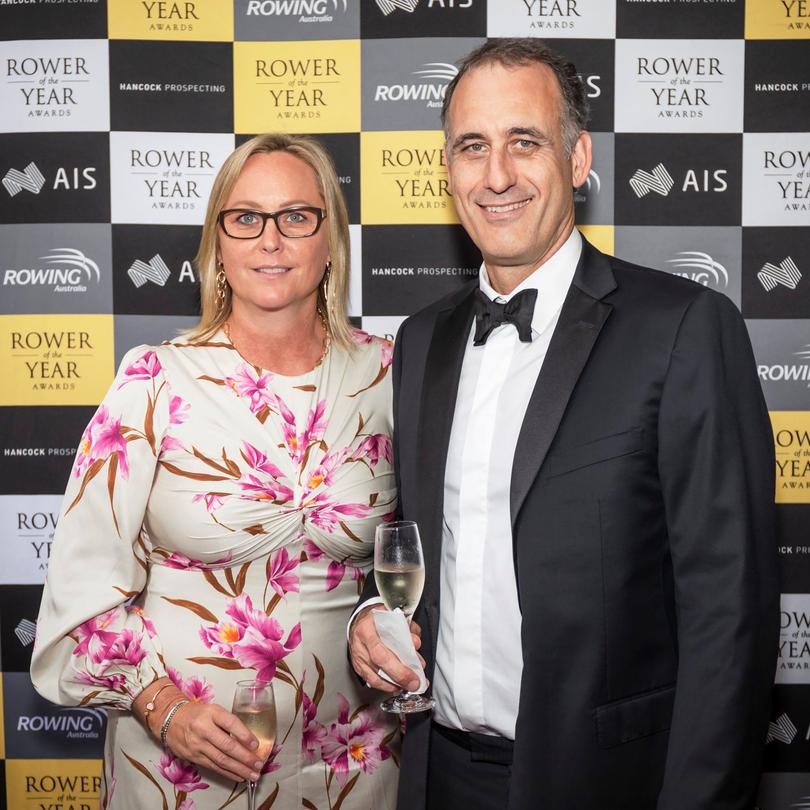
From a policy development perspective, inconsistencies between State and Federal regulation and long timeframes for project approvals are a concern.
“We are in a race here to get projects to market. And the longer things drag out, there’s more risk and reluctance of people to invest,” he says. “Our tax system should encourage investment, not work against investment.
“Obviously the other one important one is industrial relations — there is just the most phenomenal opportunity to create a lot of prosperity, a lot of jobs, high-paying jobs. But the more complexity we add into our workplace laws, the more restrictions we put, the harder it is going to be to get these projects up and running.”
Scott also has a keen eye on how Australia lifts its lagging productivity growth, though says the concept of productivity itself is not well understood. He views it as being “able to create more value all the time” — which means businesses need to be able to adapt to changes in the market, better leveraging of technology and Australia working smarter.
“Productivity is really important in an internationally competitive market,” he says.
I think one of the biggest things we could do to enhance Australia’s prosperity and productivity is to improve the health of Australians,
“I think that the solution here is to be really careful about changes that are reducing flexibility, adding cost, adding red tape, they are things that you should watch out for. Because the markets in which we’re operating are so dynamic now we need to be able to constantly evolve.”
Worsening productivity growth has some experts worried due to Australia’s ageing population, which is expected to lower the proportion of working-age people and increase the number of retirees. Which brings us back to Wesfarmers Health, which is expected to capitalise on the country’s changing demographics, as well as what Scott sees as a more health-conscious population than 20 years ago.
“I think one of the biggest things we could do to enhance Australia’s prosperity and productivity is to improve the health of Australians,” he says, adding health care costs will keep increasing unless smarter ways are conceived to make it more accessible and more affordable.
“If we can’t do that, then taxes are going to go up, government spending is going to go up. And ultimately, Australians aren’t going to be as healthy. So, the demographic factors, the trends are favourable for health. But at the end of the day, it’s not good enough just to be in an industry that has favourable tailwinds, you need to have a point of difference. You need to have efficient business models. And that’s what we’re really focused on.”
Those efficient business models should stand the retailers of the Wesfarmers empire in decent stead this year, particularly with household budgets still under pressure from elevated interest rates and housing costs.
“We are trying to make sure that we have the lowest prices possible that we have a really competitive offer to help people save money when they need to save money,” Scott says of Kmart, Target and Officeworks. Elsewhere he’s keen for the health division to “start to get some runs on the board ... (I would) love to start seeing some progress there”, and looking forward to the first lithium from Mt Holland getting to port “and onto a boat”.
Scott himself is excited for a trip to Paris later this year for the Olympics, with wife Liz — a water polo gold medallist in 2000 — on the Australian Olympic Committee board. It’s a trip that will also mark the end of his tenure as Rowing Australia chair. He’s also looking forward to seeing Queens of the Stone Age play Red Hill Auditorium in February.
On the home front, he hopes for better fortunes in his garden, which makes him an avid customer of Bunnings, even keeping the hardware giant’s boss, Mike Schneider, informed about how his Black Russian heirloom tomatoes are faring. (They’re “quite challenging” to get right, Scott says, but he’s spending “a lot of money at Bunnings” to get them there.)
Originally published on The West Australian
